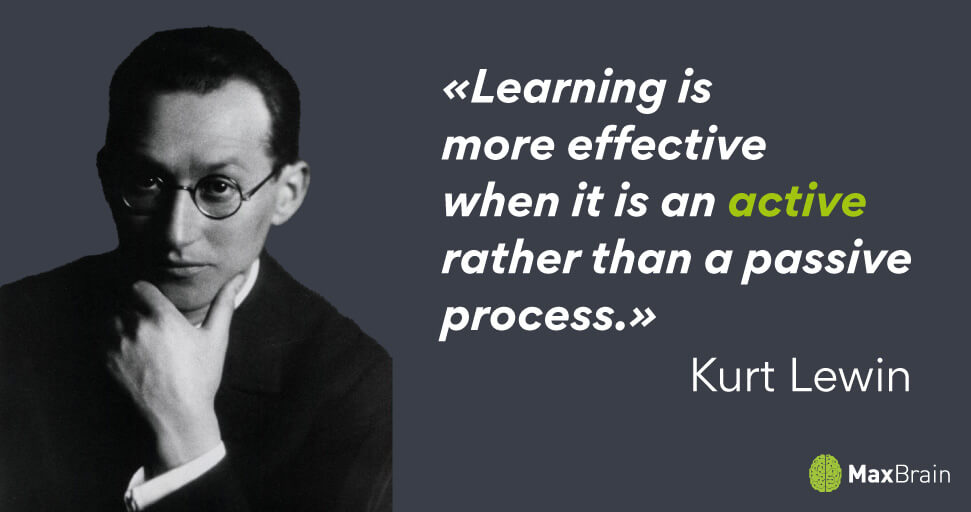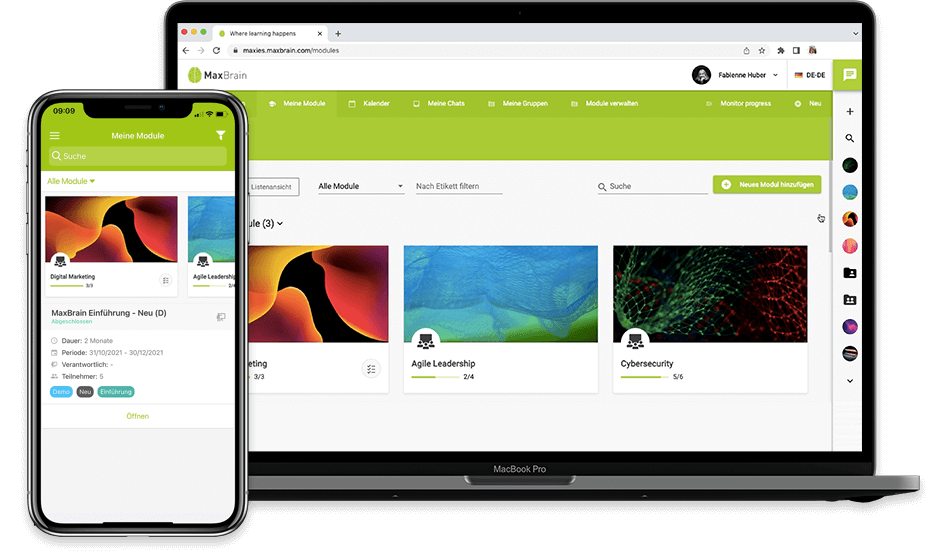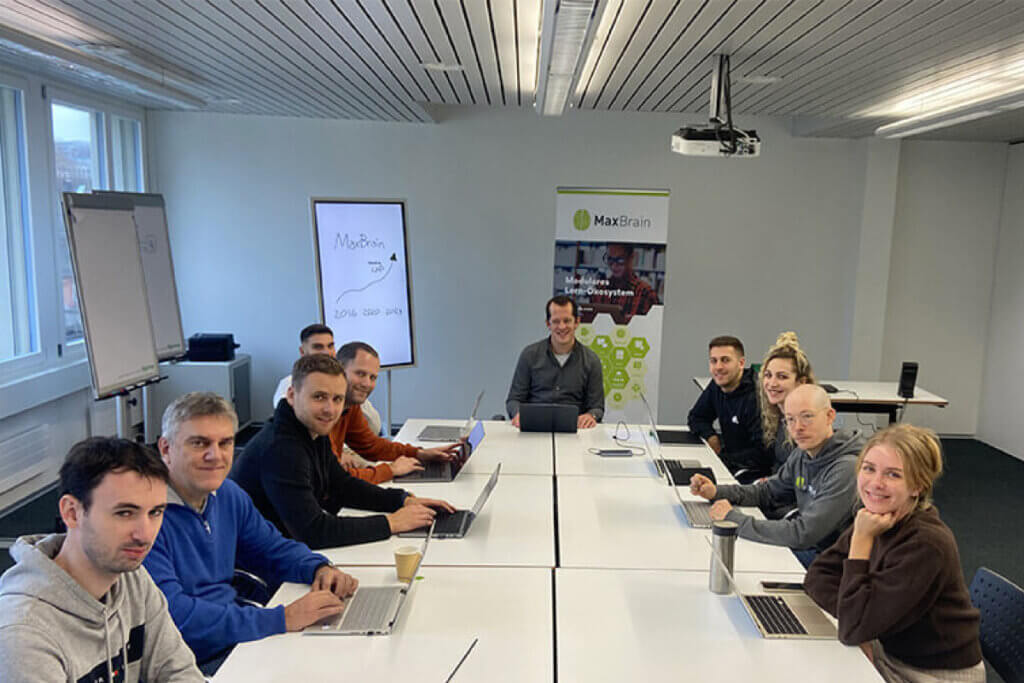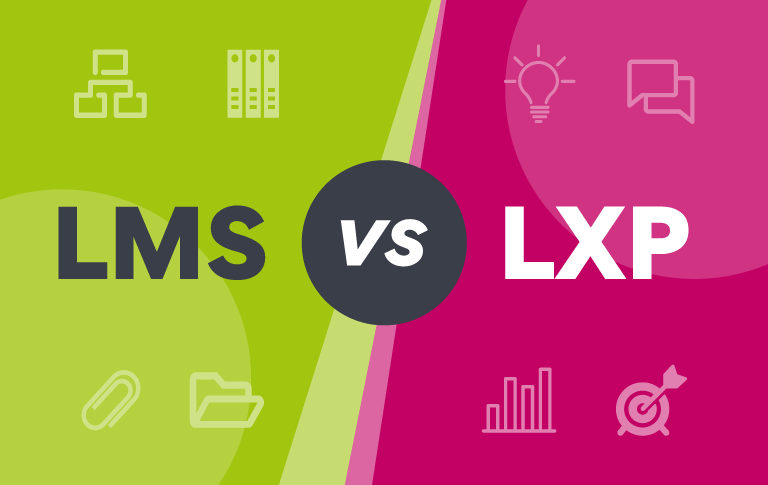Download this article as a white paper in PDF format:
Why an LMS? (Summary)
Why an LMS (Learning Management System) is important, even critical to the success of an organization, can be discussed from two perspectives:
1. from the perspective of management and employees, or
2. with regard to an LMS versus alternatives, in particular collaborative platforms such as Microsoft Teams, Google Drive, OneDrive etc.
Every member of management has an interest in their role in ensuring that employees receive further training. After all, employees are the most important success factor of any organization. Depending on their role in management, specific priorities determine which reasons speak in favor of an LMS.
From the employees' point of view, an LMS is particularly attractive because further training can improve skills and thus create better career opportunities. Employees are also usually more motivated if they can work faster, better and therefore more successfully thanks to further training.
In the second part of this article, we would also like to briefly explain why an LMS is usually more effective than any alternative for establishing a learning culture. The ten most important reasons:
1. focus and centralization of further training
2. personalization and relevance of learning content
3. intelligent learning paths
4. tracking and reporting
5. consistency
6. interactivity
7. feedback and optimization
8. commitment and long-term success of continuing education
9. scaling and integration into existing systems
10. employer branding to attract and retain talent.
Introduction
"Why an LMS?" is a question that companies in particular ask as long as they do not yet offer their own learning platform or company academy for employees.
By "LMS" we mean a professional learning management system or a modern learning experience platform (LXP) to provide employees or business partners with centralized, efficient and personalized training.
In our other article LMS vs. LXP, we have already discussed the difference between these two terms in detail. For the sake of simplicity, we will summarize both LMS and LXP here under the abbreviation "LMS".
There are various reasons why companies are not yet using an LMS:
Learning is not a priority: A - decreasing - number of companies still do not see training their employees as a priority: A dangerous competitive disadvantage in the medium to long term.
No knowledge of LMS: Most companies do not specialize in digital learning platforms. Unsurprisingly, some companies, especially smaller ones, simply do not know what an LMS is and why it makes sense to have their own learning platform.
Chaotic training: Others rely on decentralized, often rather chaotic or randomly organized employee training.
Collaborative document sharing as an alternative: Other companies rely on collaborative platforms such as Microsoft Teams, Google Drive, Microsoft OneDrive, internal wikis or intranets such as Sharepoint to share documents, training materials or similar with employees. These companies therefore see no need to use an LMS that specializes in learning.
No approval: No approval has yet been given by the management for the introduction of a professional LMS/LXP.
As can be seen below:
An LMS offers advantages that have a decisive influence on the business success of a company.
In this blog article, we take an in-depth look at the question "Why an LMS?".
In the first part, we take the perspective of the people who are responsible for the success of a company: the executive board, management and employees.
In the somewhat shorter second part of this blog article, we compare the idea of a modern LMS with alternative, collaborative platforms that are sometimes used - to the detriment of the company - in place of a dedicated learning platform.
For us at MaxBrain as the provider of the leading Learning Experience Platform (LXP) in Switzerland, the question "Why an LMS?" is of course central to our product development, our marketing and our entire corporate strategy.
Why an LMS? - From the perspective of management and employees
For every function in the management of a company and among its employees, there are various reasons why an LMS is valuable, even crucial, for business success.
We would therefore first like to summarize the most important advantages and interests that motivate a Chief Executive Officer (CEO), his or her management functions and employees to set up and operate a Learning Management System professionally throughout the company - and even beyond.
CEO: LMS as a strategic, success-critical corporate advantage

The Chief Executive Officer (CEO) bears overall responsibility for the success of the company.
The skills and motivation of employees are the most important success factor in the vast majority of organizations. A company can hardly ever be successful without the skills and motivation of its employees.
A strong learning culture supported by a professional LMS directly contributes to a company's business success. According to a study by IBM, 84% of employees in the best companies receive the training they need.
In our own conversations and surveys with CEOs of innovative, fast-growing companies, the most common answers to the question "Why an LMS?" are sorted by frequency:
1. optimization of knowledge management: We would like to offer our employees our own company academy (LMS) to make knowledge management faster, more efficient and more user-friendly for all learners in the company.
2. eliminate knowledge deficits: We want to eliminate training gaps in various departments and teams in order to make our company fit for the future.
3. secure knowledge (brain drain): We want to secure our company's knowledge capital by retaining the expertise of our employees before they leave the company due to retirement, job changes, maternity, etc.
4. increase productivity: We rely on targeted training and further education to increase the productivity of our employees.
5. competitive advantage: At the same time, we want to use our learning platform to create a genuine Unique Selling Proposition (USP) for our company and play it out strategically and operationally.
6. more turnover and margin: Our main focus in the training courses is on increasing turnover and margin, particularly in our sales department.
7. LMS as a sales channel (Educate First Marketing): Apart from the further training of employees, we want to use our learning platform for the further training of our business customers. According to the approach of Educate First approach, we use the LMS to provide valuable information and explain the benefits and features of our offering to our customers. We want to build trust, establish ourselves as a thought leader in the industry and ultimately sell more through this strategic position.
CFO: Optimizing costs and financing from the sale of training courses

The role of the Chief Financial Officer (CFO) includes the preparation and monitoring of budgets, compliance and risk management.
In our work at MaxBrain, we have repeatedly found that members of the Executive Board who take on the CFO role very often work closely with the HR department; in addition to the topics of compliance and risk management, also to support the CEO in the allocation of resources.
The CFO is therefore often heavily involved in the introduction of a learning platform and expects the answers to the question "Why an LMS?" to match their role.
The most frequent answers:
1. total cost of ownership: When evaluating an LMS, we want to be able to estimate the cost of implementing and maintaining a project to establish a learning culture that is critical to success.
The question of costs is often not trivial, as providers of LMS solutions can only be compared in part:
Some look more favorable because the medium to long-term maintenance and further development costs are either not reported at all or only incompletely.
Other LMS providers are characterized by an above-average service and consulting ethos, which is crucial for the success of a learning culture, but remains difficult to calculate financially.
In any case, a CFO is well advised to adopt as professional, i.e. far-sighted and transparent a perspective as possible when budgeting for an LMS. And this perspective will then also shape the decision for or against an LMS.
3. cost reduction: Thanks to LMS, we would like to reduce the travel costs for team training and provide part of the training remotely, i.e. purely digitally or via blended learning models.
4. predictable monetization through customer training: Our LMS should not only be used for employee training, but also as a marketing platform for business customers.
Customers should invest in access to valuable information and training via subscription models or community models that are equally profitable for the company and its customers.
5. self-supporting learning platform: The learning platform (LMS) should ultimately be self-supporting thanks to a reduction in operating expenses (OPEX) and monetization through the sale of training courses to business customers.
CTO: The perfect user experience, data security and integrations

The Chief Technology Officer (CTO ) is responsible for the technological strategy and the implementation of technology projects in an organization. He or she advises or decides within the management which technical platforms are to be used.
Occasionally, the CTO advises or decides whether software should be developed in-house or provided by a third-party provider. It is worth focusing the team's investment and energy on the software that is part of the company's core business.
For most companies, the in-house development of a learning management system (LMS) is not part of their core business, so the CTO usually prefers to use third-party providers. The boundaries between technology and product management are becoming increasingly blurred.
The most common answers from the CTO to the question "Why an LMS?":
1. perfect user experience: We want a company-wide platform that is intuitively inspiring, has a modern feel and is integrated and demanded by employees as a necessary training tool in their day-to-day work.
2. 7x24x365: Continuing education and learning should be possible 7 days a week, 24 hours a day, 365 days a year. Independent of time and place.
3. integration into systems and processes: We want an LMS that enables seamless integration into all existing systems and processes.
4. data security and data protection must be guaranteed at all times and everywhere.
5. technological competitive advantage: We want a productivity tool that offers a further technological competitive advantage and can be fully utilized by all employees, partner companies or our customers every day.
6. play out learning content quickly and easily: We want to empower users to create and deliver digital learning content faster, better and more easily to save time and money.
CSO: More sales, now!

The Chief Sales Officer (CSO) is responsible for the management and control of all sales activities in a company. Their most important key figures are sales and sales growth.
For most companies that invest in direct sales with larger teams, sales training is essential.
Sales employees must be very familiar with the company's offering, in particular its value for customers and its positioning compared to the competition, in order to generate more sales.
Sales training courses also often include topics on optimizing sales processes, training on needs analysis, dealing with objections, closing techniques, etc.
The differences between employees who have mastered solid sales techniques and those who have never undergone further training can be enormous.
A particular challenge for a CSO is increasingly posed by sales teams that are spread across different locations. Different locations always mean that the transfer of knowledge about offers and sales techniques becomes more complex.
The CSO is therefore often one of the members of management who can give the clearest answers to the question "Why an LMS?". The answers here can be very specific:
1. sales growth (example): By introducing an LMS, we want to train our sales staff in such a way that 15% more sales can be generated.
2. reduction in training costs (example): We want to train our remote teams and sales employees at the various locations more quickly, easily and cost-effectively. The training costs should be reduced by 20%.
3. sales training as an integral part: We want an LMS that enables modern learning from each other, with each other and alongside each other, and maximizes the effectiveness of the geographically and industry-specific distributed sales organization.
4. systematic optimization (example): We want to record every deal won, but also every deal lost, in a 3-4 minute video learning nugget and make it available to the team via the sales management.
5 ROI: We want to improve the return on investment in the sales team, as well as the return on learning and return on communication.
CHRO: LMS as a core application for human capital management

The Chief Human Resources Officer (CHRO ) is responsible for the strategic leadership and management of the HR department in a company.
In practically all MaxBrain projects involving the introduction of a company academy, the HR management or people from the HR environment are in charge.
One reason for this is that personnel development is one of the core tasks of human resources management.
On the other hand, the leading role of HR in the introduction of a company academy or LMS makes a lot of sense because all processes relating to further training, career development and employer branding (should) come together and be coordinated in HR management.
Experienced CHROs in particular are already familiar with the concept and indeed the necessity of a Learning Management System (LMS) for an organization.
The question "Why an LMS?" is therefore usually answered clearly and specifically by many CHROs, similar to their colleagues in sales management. For example:
1. increasing skills: We want to challenge and promote the skills of individual employees.
2 Employer branding: The best employees are those who want to continuously develop their skills in order to deliver top performance.
With our company academy (LMS), we want to signal to our own employees and the job market that our company is future-oriented and offers exciting career and further training opportunities.
3. surveys (example): According to an internal survey, 72% of employees were clearly in favor of introducing a strong learning platform.
4. optimization of company-wide HCM processes: We want to optimize Human Capital Management (HCM).
Specifically, we want to use our LMS to make the onboarding of new employees more efficient, faster and cheaper, promote professional development on the job, improve individual career planning and, in the process, better measure, recognize and promote the potential of our talents.
5. communication of internal topics: We want to professionally address our own internal training topics, e.g. on the values of our organization.
6. optimization of HR processes: We want to digitize, automate or standardize administratively complex work processes in the HR department and thus save time and money for HR administration.
7. individual transparency about further training: We in the HR department and in management want to know at any time, at the click of a mouse, who has already attended which training courses, is currently completing them or still has to attend them.
8. modern training concepts and quality assurance: We want to be able to implement modern training concepts using multimedia, provide learning paths without or with skipping individual steps and guarantee the quality of the learning plan.
CMO: Identification with the company, internal training and LMS as a marketing platform

The Chief Marketing Officer (CMO) designs and implements a company's marketing strategy.
This includes brand management, positioning the company on the market, as well as setting up and running campaigns to draw customers' attention to the company's offering or to win them over directly.
Many CMOs lead a team of specialists for this purpose: content writers, multimedia graphic designers, performance marketing specialists, analysts, web designers, video creators, etc.
Marketing also requires a high degree of adaptability and creativity: what works well in advertising today may be outdated and ineffective tomorrow. Marketing platforms come and go. Regular further training for all employees, including the CMO himself, is a must today.
This gives rise to important reasons why a CMO is interested in a professional LMS:
1. strengthening CI/CD: We want to strengthen the corporate identity (CI) and corporate design (CD) company-wide with the learning platform.
2. identification with the company: We want to strengthen employees' identification with the company.
3. strengthening insider knowledge: We want to gain valuable insights around the market, offering and company by gaining access to the associated learning content from the areas of sales, product development and customer support and proactively shaping it where appropriate.
4. inspiration for marketing tasks: We want to learn which ideas, platforms and communication tools are used optimally and how exactly to achieve maximum return on investment for the marketing department.
5. LMS as a marketing platform: We want to use the "Educate First" approach to train our business customers on our offering and market our offering through training.
Employees:LMS as a career booster and increase in learning efficiency

Most corporate academies aim to provide further training for employees. Employees are therefore the primary target group of an LMS for companies. The question "Why an LMS?" should therefore be asked primarily from the employees' perspective.
In our experience, employees greatly appreciate the possibilities offered by an LMS, but only if they are able to use part of their working time. working time for their own further training, or the company invests working time in the further training of its employees.
If, on the other hand, employers expect employees to undertake further training during their free time, employees prefer to organize their training individually and opt for platforms of their choice without considering the interests of the company as a whole.
Apart from this preliminary remark, employees are interested in establishing a learning culture via an LMS for the following reasons:
1. further training for professional development: We want to develop professionally and learn new skills to improve our career prospects.
2. updating skills: In many industries and professions, it is crucial to always be up to date.
We want to use an LMS to keep up to date with current trends, technologies and best practices in our field.
3. time- and location-independent learning: We want to learn at any time and from anywhere. This is particularly important for employees who work from different locations or remotely.
4. personalized learning: We want to learn relevant content.
This means that the courses and learning content must be neither too banal nor too demanding, can be learned at the right pace and make sense for our personal development.
5. increasing efficiency: We want to learn how we can do our work faster, easier and more successfully.
6. certifications and qualifications: Career-enhancing courses are those that lead to valuable certificates or qualifications at the end to enable us to practice our profession and develop our career.
7. central place to learn: We want an LMS that stores training materials and knowledge in a central location and makes it easily accessible.
8. learn as quickly as possible: Learning is hard, knowledge is nice. We want to be able to gain knowledge as quickly as possible. An LMS that helps us learn 10x faster would be ideal.
At this point, it is generally worth remembering what learners want in the first place:
We have already discussed in detail what makes an ideal learning experience in our article LMS vs LXP.
Why an LMS? - Comparison with alternatives: The 10 most important differences
In addition to the perspective of individual management functions and employees, the general question also occasionally arises: Why an LMS and no alternative?
As mentioned in the introduction, at MaxBrain we occasionally come across companies that rely on other solutions that cannot be described as Learning Management Systems (LMS) or Learning Experience Platforms (LXP).
These include, in particular, collaborative platforms such as:
- Google Drive, Microsoft OneDrive or Dropbox
- Internal wikis
- Intranets such as Sharepoint, Confluence
- Chat with additional functions, e.g. Microsoft Teams, Slack etc.
- Local documents that may be exchanged by e-mail or similar
To conclude this blog article, we would like to briefly discuss the ten most important differences between an LMS and platforms that do not primarily specialize in continuing education.
These differences result from the above-mentioned interests represented by the individual roles and functions in an organization.
1. focus and centralization increase the chances of a genuine learning culture
Anyone who uses collaborative platforms such as Microsoft Teams, Google Drive or Microsoft OneDrive knows that as the number of employees and documents grows, things quickly become confusing and, in the worst case, end in organizational chaos.
Mixing learning content, courses, learning paths, learning nuggets, etc. with documents that are not relevant for training can quickly become an administrative nightmare.
An LMS, on the other hand, offers a centralized platform for all learning materials that focuses on continuing education and which employees can access at any time and from anywhere.
This focus ensures consistency in training and development across all departments and locations.
2. personalization of the learning experience makes continuing education relevant.
Even a very well-stocked collection of training documents can hardly be personalized without massive and regular effort. personalized personalized without massive and regular effort.
However, personalizing the learning experience is critical to the success of establishing a true learning culture within an organization.
Nothing is more frustrating for employees than consuming learning content that is too banal or too demanding.
A genuine learning culture picks up each person from their current level of knowledge.
And that is precisely the purpose of an LMS, especially the modern versions of it: the Learning Experience Platform (LXP).
3. learning paths help to learn in a more targeted way.
An LMS supports employees in planning and achieving their professional goals - better than any alternative.
4. tracking and reporting provide a better overview of learning progress.
Some companies with whom we at MaxBrain have been in contact and who are now among our customers documented their employees' training with Excel sheets before introducing an LMS and used such manually maintained tables to report who had completed which compliance course, for example, where there was room for improvement or which employees had excelled.
Apart from the fact that Excel tables are prone to errors, the effort involved can quickly increase enormously, especially for companies that have to "track" more than 50 employees in this way.
Modern LMS platforms have robust tracking and reporting features that enable managers and HR staff to better assess employee learning progress, ensure that compliance training is completed properly and that employees' skills can be developed in a targeted manner.
A classic application in which tracking and reporting can have an enormously positive effect is training for onboarding new employees.
Imagine the cost savings that can be made if you can train new employees in 2 weeks instead of 2 months thanks to analysis and optimization of learning processes!

5 Consistent, comparable delivery of training increases the likelihood of productivity gains.
Companies with several locations in particular often suffer from the same problem: consistency in the knowledge and knowledge transfer of employees.
A classic case: Imagine there is a particularly talented sales employee in a regional branch office who, thanks to special sales techniques, generates many times the turnover of her colleagues at head office. The head office may only see the results - the impressive turnover. However, there is no transfer to the other, geographically displaced employees.
An LMS can ensure that all employees receive the same learning content and experience, maintaining the quality and consistency of the training provided.
6 Interactivity increases the effectiveness of learning programs.
A dry collection of school materials inspires very few employees.
As the psychologist Kurt Lewin recognized around 100 years ago: Learning is more effective when it is an active rather than a passive process.

Interactivity in the form of flashcards, quizzes or general learning objective checks drastically increases the success of continuing education programs.
A good LMS usually offers a form of interactivity, either out of the box or through connection to leading learning tools, that alternatives can only provide through laborious compilation.
7 Feedback and assessments help to better assess skills and improve learning content.
Through automated assessments of learning progress, learning objective checks or completed courses, an LMS can provide immediate feedback that helps learners to assess their skills more objectively.
Conversely, feedback can also be provided by learners on teachers or course content. At MaxBrain, professional course providers such as WEKA, digicomp and Goethe Business School in particular use the feedback functions integrated via SurveyMonkey to specifically identify weaknesses in the learning content and optimize the course offering.
An LMS that offers such functions can ensure that the learning experience for employees is systematically improved.
And that leads us to the next, general and important success factor of every learning initiative:
8. commitment is an integral part of modern LXPs.
Because modern LMS platforms offer interactive functions such as flashcards, quizzes or even games, they increase employee engagement and motivation to learn in the long term.
Thanks to personalized recommendations, a good learning experience platform can offer recommendations for exciting learning content that specifically addresses the interests of employees and helps to better fulfill their personal goals or wishes.
The fact is, even the best collaborative platform that doesn't specialize in learning is unlikely to achieve the long-term engagement that an exciting learning platform can provide.
9. scaling and integrations for sustainable learning cultures.
LMS platforms can be scaled more easily than loose collections of documents, depending on the number of learners or the complexity of the training requirements. This is because they follow a predefined structure that standardizes the learning process better than any alternative.
As a company grows, the training program with an LMS can grow with it, without the need to increase training staff or resources accordingly.
A modern LMS is also openly programmed and allows integration into existing systems and processes.
For example, there are now talent or human capital management systems to optimally manage HR processes.
These include providers such as Personio, Sage, Abacus and others.
10 Employer branding, social learning and the establishment of a strong learning culture thanks to LMS.
In our organization, we value further training, progress and innovation. We take an interest in our employees and understand that their skills are one of the most important factors in the success of our company.
As we have already seen above with the interests of the Chief Human Resources Officer (CHRO), companies use the operation of a learning platform for their employer branding, i.e. for the positioning of the company internally and on the labor market.
The initially somewhat abstract goal of a strong employer brand has concrete consequences in the practice of a successful company academy: Employees begin to learn with each other, from each other and alongside each other. An extremely effective phenomenon for learning and further training is developing: social learning.
Employees learn by observing other, successful colleagues. This leads to discussions, more effective collaboration and a feedback culture that is simply lacking in many places and therefore leads to a secure competitive advantage.
The answer to the question "Why an LMS and not some other collaborative platform?" can therefore also be a simple one:
To establish a learning culture that accelerates the company's success.

Further blog articles and recommendations
In our MaxBrain blog you will find a series of further articles once the question of why an LMS has been answered.
In particular, we recommend the following articles:
Download this article as a white paper in PDF format:

Are you looking for a checklist for LMS providers?
Questions for you:
Did you like this article?
If so, please share this article on your social media channels. Thank you very much!




















